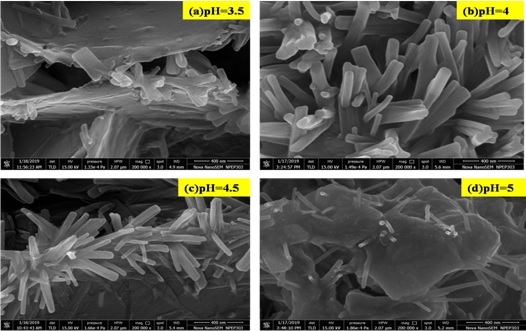NANOSYSTEMS: PHYSICS, CHEMISTRY, MATHEMATICS, 2020, 11 (5), P. 519–528
Influence of complexing agent, pH of solution and thickness on morphological and optical properties of ZnS particles layer prepared by electrochemical deposition technique
Jitendra Borse – Department of Physics, Late Pushpadevi Patil Arts & Science College, Risod 444506, India; jaborse@gmail.com
Arun Garde – Department of Physics, SPH Arts, Science and Commerce College, Nampur 423204, India; arungarde@yahoo.co.in
Zinc sulfide particles layer were grown on FTO glass and stainless steel substrates by electrode position technique from aqueous solution that contained 0.1 N zinc sulfate, 0.1 N sodium thiosulfate and 0.1 N triethanolamine was used as complexing agent. The deposing potential was analyzed by cyclic voltammetry technique. The ZnS particle growth was studied in the range of deposition time from 10 to 40 minutes. The thickness of layer was found to be the highest, 3.92 μm, at 20 min. The various percentage of complexing agent, pH of solution and thicknesses of film were characterized by scanning electron microscope (SEM) and UV-Visible spectrophotometer. The effects of complexing agent, pH of solution and thickness of layer on morphological and optical properties of ZnS were investigated. The Electrical resistivity of ZnS was found thickness dependent. The Chemical Composition of ZnS particles analysed by EDAX (Energy Dispersive Analysis by X-ray).
Keywords: complexing agent, electrodeposition, pH of bath, resistivity, thickness of ZnS particles layer.
DOI 10.17586/2220-8054-2020-11-5-519-528
